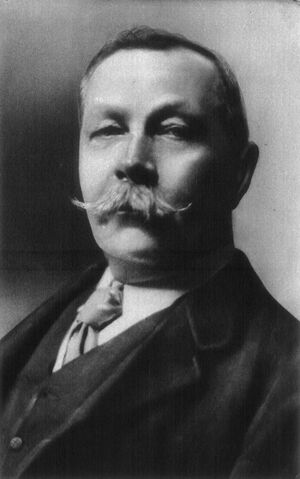Difference between revisions of "Arthur Conan Doyle"
(Added: website.) |
(unstub) |
||
| Line 2: | Line 2: | ||
|wikipedia=https://en.wikipedia.org/wiki/Arthur_Conan_Doyle | |wikipedia=https://en.wikipedia.org/wiki/Arthur_Conan_Doyle | ||
|amazon=https://www.amazon.com/Arthur-Conan-Doyle/e/B000AQ43GQ/ | |amazon=https://www.amazon.com/Arthur-Conan-Doyle/e/B000AQ43GQ/ | ||
| − | |image= | + | |image=Conan doyle.jpg |
|birth_date=1859-05-22 | |birth_date=1859-05-22 | ||
|death_date=1930-07-07 | |death_date=1930-07-07 | ||
|constitutes=doctor, author | |constitutes=doctor, author | ||
| + | |description=Creator of Sherlock Holmes | ||
|powerbase=http://www.powerbase.info/index.php/Arthur_Conan_Doyle | |powerbase=http://www.powerbase.info/index.php/Arthur_Conan_Doyle | ||
|alma_mater=University of Edinburgh Medical School | |alma_mater=University of Edinburgh Medical School | ||
| Line 16: | Line 17: | ||
|employment= | |employment= | ||
}} | }} | ||
| + | |||
| + | '''Sir Arthur Ignatius Conan Doyle''' was a British writer and physician. He created the character [[Sherlock Holmes]] in 1887 for ''[[A Study in Scarlet]]'', the first of four novels and fifty-six short stories about Holmes and [[Dr. Watson]]. The Sherlock Holmes stories are considered milestones in the field of [[crime fiction]]. | ||
| + | |||
| + | Doyle was a supporter of the campaign for the reform of the [[Congo Free State]] that was led by the journalist [[E. D. Morel]] and diplomat [[Roger Casement]]. In 1909 he wrote ''[[The Crime of the Congo]]'', a long pamphlet in which he denounced the horrors of that colony. He became acquainted with Morel and Casement, and it is possible that they inspired several characters that appear in his 1912 novel ''[[The Lost World (Arthur Conan Doyle)|The Lost World]]''. Later, after the [[Easter Rising]], Casement was found guilty of [[treason]] against [[the Crown]], and was sentenced to death. Doyle tried, unsuccessfully, to save him, arguing that Casement had been driven mad, and therefore should not be held responsible for his actions.<ref>[[Rajiva Wijesinha|Wijesinha, Rajiva]] (2013). "Twentieth Century Classics: Reflections on Writers and Their Times". Cambridge University Press.</ref> | ||
| + | |||
| + | Conan Doyle was a vigorous supporter of the British effort in the [[First World War]] . | ||
| + | |||
{{SMWDocs}} | {{SMWDocs}} | ||
==References== | ==References== | ||
{{reflist}} | {{reflist}} | ||
| − | |||
Latest revision as of 01:50, 18 June 2021
(doctor, author) | |
|---|---|
 | |
| Born | Arthur Ignatius Conan Doyle 1859-05-22 Edinburgh, Scotland, United Kingdom |
| Died | 1930-07-07 (Age 71) Crowborough, Sussex, England, UK |
| Nationality | British |
| Citizenship | United Kingdom |
| Alma mater | University of Edinburgh Medical School |
Creator of Sherlock Holmes | |
Sir Arthur Ignatius Conan Doyle was a British writer and physician. He created the character Sherlock Holmes in 1887 for A Study in Scarlet, the first of four novels and fifty-six short stories about Holmes and Dr. Watson. The Sherlock Holmes stories are considered milestones in the field of crime fiction.
Doyle was a supporter of the campaign for the reform of the Congo Free State that was led by the journalist E. D. Morel and diplomat Roger Casement. In 1909 he wrote The Crime of the Congo, a long pamphlet in which he denounced the horrors of that colony. He became acquainted with Morel and Casement, and it is possible that they inspired several characters that appear in his 1912 novel The Lost World. Later, after the Easter Rising, Casement was found guilty of treason against the Crown, and was sentenced to death. Doyle tried, unsuccessfully, to save him, arguing that Casement had been driven mad, and therefore should not be held responsible for his actions.[1]
Conan Doyle was a vigorous supporter of the British effort in the First World War .
A Document by Arthur Conan Doyle
| Title | Document type | Publication date | Subject(s) | Description |
|---|---|---|---|---|
| Authors' Declaration of September 1914 | manifesto | September 1914 | WW1 | An declaration in support of World War 1 by 53 leading British authors. One of the earliest efforts of the nascent War Propaganda Bureau to craft a coherent intellectual message in support of the war effort. |
References
- ↑ Wijesinha, Rajiva (2013). "Twentieth Century Classics: Reflections on Writers and Their Times". Cambridge University Press.